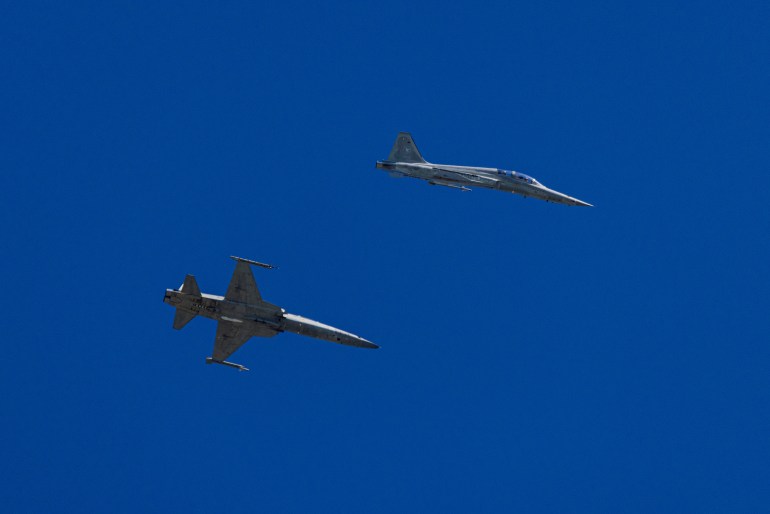WASHINGTON
- China on Thursday renewed its threat to attack Taiwan, nearly a week after it began war games near the island, while Taiwan rejects the "one country, two systems" model proposed by Beijing in a "white" book published this week.
Taiwan Foreign Ministry spokeswoman Guan Oo said - at a press conference - that only the people of Taiwan have the right to self-determination.
The US and Taiwan sides believe that China is using US House Speaker Nancy Pelosi's visit to Taipei as "a pretext to create a new situation to intimidate the people of Taiwan."
Earlier this week, Taiwan began its own military exercises in response to the Chinese maneuvers.
Escalation step
In an interview with Al Jazeera Net, Asian affairs expert Joshua Kurlanczyk noted that "China's maneuvers are relatively important, but they are just exercises. They could have made tougher choices, so the exercises are actually a less severe choice than they would have taken."
"Although they simulated the blockade of Taiwan, they did not in reality; the blockade will harm China in many ways," Kurlanczyk added.
"This is not a reckless reaction as some may fear. The biggest fear is that China is continuing this, and in this way China is pressing for its army to spread around Taiwan, which is a greater danger because it will take away Taiwan's freedom in open waters and in the airspace," he added.
While Sun Yun, an expert on US relations with East Asian countries at the Stimson Center in Washington, said that the Chinese maneuvers around Taiwan are "completely unprecedented, and most importantly, they set a precedent that China can repeat in the future, arguing that they did so before."
As for Michael Swain, director of the East Asia Program at the Quincy Institute, he saw that "the live-fire military exercises around Taiwan are very important, as they represent a significant escalation in the ongoing confrontation between Beijing and Washington for several years."
In an interview with Al Jazeera Net, Soen saw that the Chinese moves represented a response to a major provocation from the American side in the form of Pelosi's trip (which Beijing considers the latest erosion in relations between the two countries), and the Chinese began to change the security environment around Taiwan, confirming a larger and continuing military presence around the island of Taiwan. , including rehearsals for a possible future siege.
war option
Despite the tension in Beijing, Washington and Taipei relations, the three countries share many ties and economic relations that make it difficult for any party to deal lightly with the possibility of a war between them.
Kurlanczyk does not believe that China will invade Taiwan in the next two years, as it faces major problems at home with its failed strategy in the face of the outbreak of the Covid-19 virus, low growth rates, the General Party Congress next November, as well as a fair amount of grumbling dissatisfaction among its people."
"He believes that eventually China would have moved in that direction regardless of Pelosi's visit," Kurlanczyk emphasized. "Chinese President Xi Jinping is very focused on and talks about Taiwan all the time, so I don't think they need to visit Pelosi to do that escalation."
While Sun said - in an interview with Al-Jazeera Net - that "China will not attack Taiwan because it is not sure of the American reaction, amid Chinese doubts about its ability to win, and it is important to remember that the current Democratic Progressive Party government in Taiwan will remain in place until 2024, and therefore It is unlikely that there will be a change of policy on the part of Taiwan to declare independence, so China will have no reason to start a war."
Sohn agrees with Kurlanczyk's assessment that Pelosi gave militants in China a rare opportunity to justify their escalation, which included firing missiles over the island for the first time.
The Taiwanese army conducted live-fire exercises after China completed its largest military exercise around the island (Getty Images)
Chinese toughness
On the other hand, Michael Swain agrees with the Pentagon's assessment that China will not attempt to invade Taiwan within the next two years.
Soen says, "Beijing has major domestic and international problems, and is still far from certain that it can win the conflict over Taiwan. It is only done if Beijing is confident of its success, or concludes that it has no other option to prevent Taiwan independence."
"Those who think that China is certainly ready to attack Taiwan and are just waiting for its military to be reinforced ignore or underestimate all the many other factors that argue against taking such a risk," he added.
The Chinese military refuses to answer the calls of their American counterparts, and Sun sees this as a "reassuring behavior that also reflects the Chinese assessment that the danger is not worrisome enough to justify a phone call between the defense ministers of the two countries."
Some Chinese recognize the need for effective crisis management to avoid conflict, while others primarily believe in demonstrating China's resolve and resolve and view crisis management as a Western way to make China accept the continued erosion of the one-China policy in the United States, a policy that has lost nearly all of its credibility among many. of hardliners and extroverts in China."
While Soen noted, "The Chinese are now not interested in engaging with the United States in an attempt to control the crisis, and see this as a way to divert attention from Chinese anger and the actions that the United States and Taiwan should take in the future."
He added that Beijing is currently engaged in expressing its determination to oppose what it sees as a steady hollowing out of the United States' one-China policy, and they are not yet ready to have the two militaries talk about how to avoid escalation.

